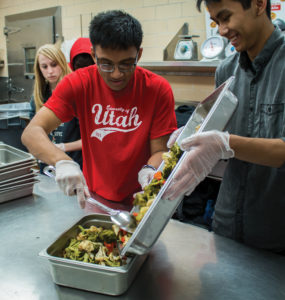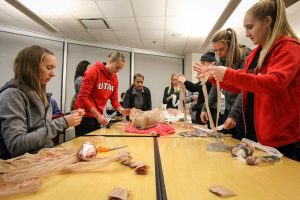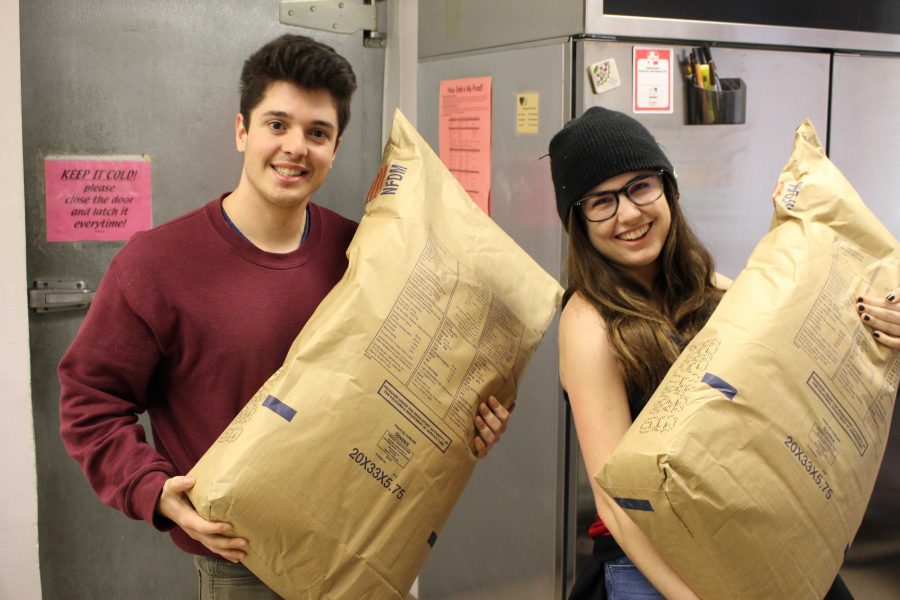The Bennion Center Scholars program is one of many campus programs offering students a chance to experience community outreach through their university studies. The program’s website highlights the Bennion Center as an effort in “collaboration and collective impact as we seek to create deeply engaged learning experiences for students and meet the needs of our communities.”
“The Bennion Center Scholars program has helped me connect my studies and passions to the real world in an impactful way,” said Megan Peterson, a third-year strategic communications major, still in her first year as a part of the scholar leadership committee. “This program has helped me learn more about myself, what I am passionate about and what I am good at. It has also taught me how to think about the larger community I am a part of and how I can take my skills and make a real and lasting impact in the world.”

The program was introduced as a student initiative in 1992 before its creation by U leadership. Today, the program currently has around 35 members who commit to two years in the scholar leadership program. Megan Richards, learning coordinator with the Bennion Center, said the founding of the program “was unique in that it had such a quick turnaround time before becoming a campus program. It took only one academic year to get things off the ground, which shows how committed the university was to the idea back then, and how it still is to this day.” The program offers opportunities through conferences, mentorship requirements and academic engagement.
The first year of the program includes an emphasis on university coursework and research into prospective community projects. Collaboration between different majors and backgrounds is encouraged. To help facilitate this, each scholar is paired with a peer mentor for guidance. As part of the leadership committee, Peterson also serves as a peer mentor. “Through my one-on-one meetings, I get to hear about their passions, struggles and projects. Every time I meet with one of them, I am truly inspired by the amazing work that all of them are doing. There are so many hardworking and passionate people in this program who truly just want to help out the community.”
The second year of the program culminates with each student completing their capstone project. The project is completed in collaboration with a community partner and faculty mentor. The project demonstrates each scholar’s knowledge of a specialized subject as well as leadership through logistical and time constraints. Past projects include research into implicit bias, the startup of a global healthcare non-profit and the production of live TV shows for patients at Primary Children’s Hospital.
Applicants are welcome year-round provided that students meet the minimum requirements. Any student with at least two years remaining before graduation and a minimum GPA of 3.0 qualify. When asked about current opportunities through the program, Richards said that “if there is a real, legitimate desire to make a positive impact on the community and it’s clear that a student will put in the necessary amount of work, they will get accepted.”
The program is an easily accessible means for local community organizations to find active volunteer leadership. Student-directed programs are organized into six issue areas: arts and recreation, education and advocacy, health and ability, international, social justice and sustainability and food justice.

(Photo by The Daily Utah Chronicle)
Further elaborating on leadership opportunities within the organization, Peterson said, ”As the marketing and communications coordinator, I have been able to develop print and digital advertisements. Since I’m studying strategic communication and want to work in marketing and communications after I graduate, this opportunity has been perfect for me. I have learned how to take many of the skills I’ve learned in class and actually help a program that I believe is very impactful on the community and students.”
Bennion scholars bring together the highest standards of community service on campus and export them to the local community. The program embraces collaboration and a steep learning curve to implement change and inspire leadership.
Outside of individual projects, the scholars help organize the Bennion Center’s Saturday Service Projects, which are volunteer opportunities open to the public. They also work with local community partners to offer diverse volunteer opportunities beyond the scholar program.
“It [the scholar program] also is a means of civic engagement, of opening dialogues. The hope is to introduce students to new people and external ideas that they may be unfamiliar with, and that they couldn’t get exposed to otherwise,” Richards said. “That could mean exposure to different ethnicities, religious backgrounds or political affiliations.”
The next Saturday Service Project hosted by the Bennion Center will be on Feb. 28 from 8:30 a.m. to 12:30 p.m., called the “Access to Healthcare Saturday Service Project.” Breakfast begins at 8:30 a.m., with all projects beginning at 9 a.m. Volunteers can work on any of six projects, from “Days For Girls” assembling feminine hygiene kits, to “Friends For Sight,” where volunteers will be trained on vision screening protocols.


